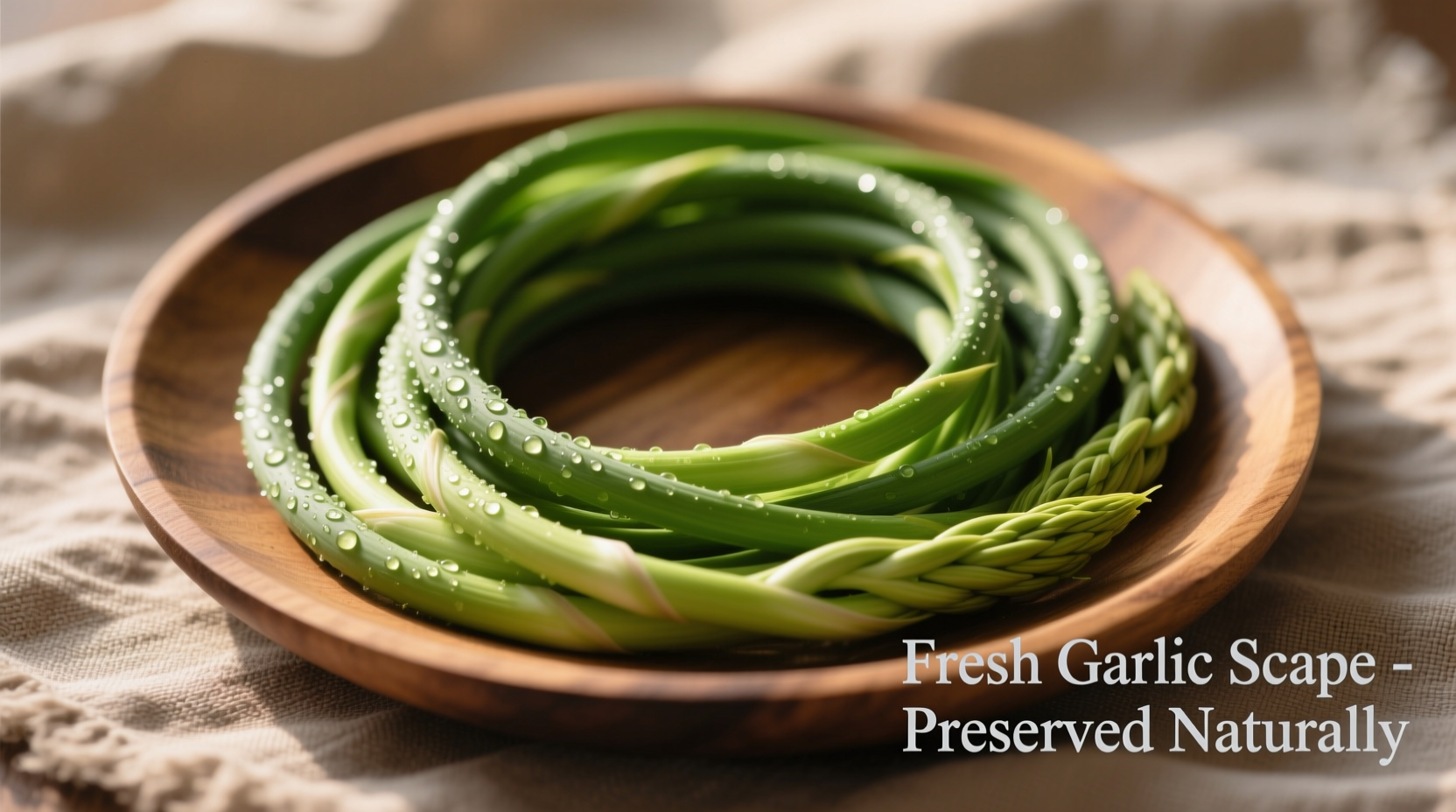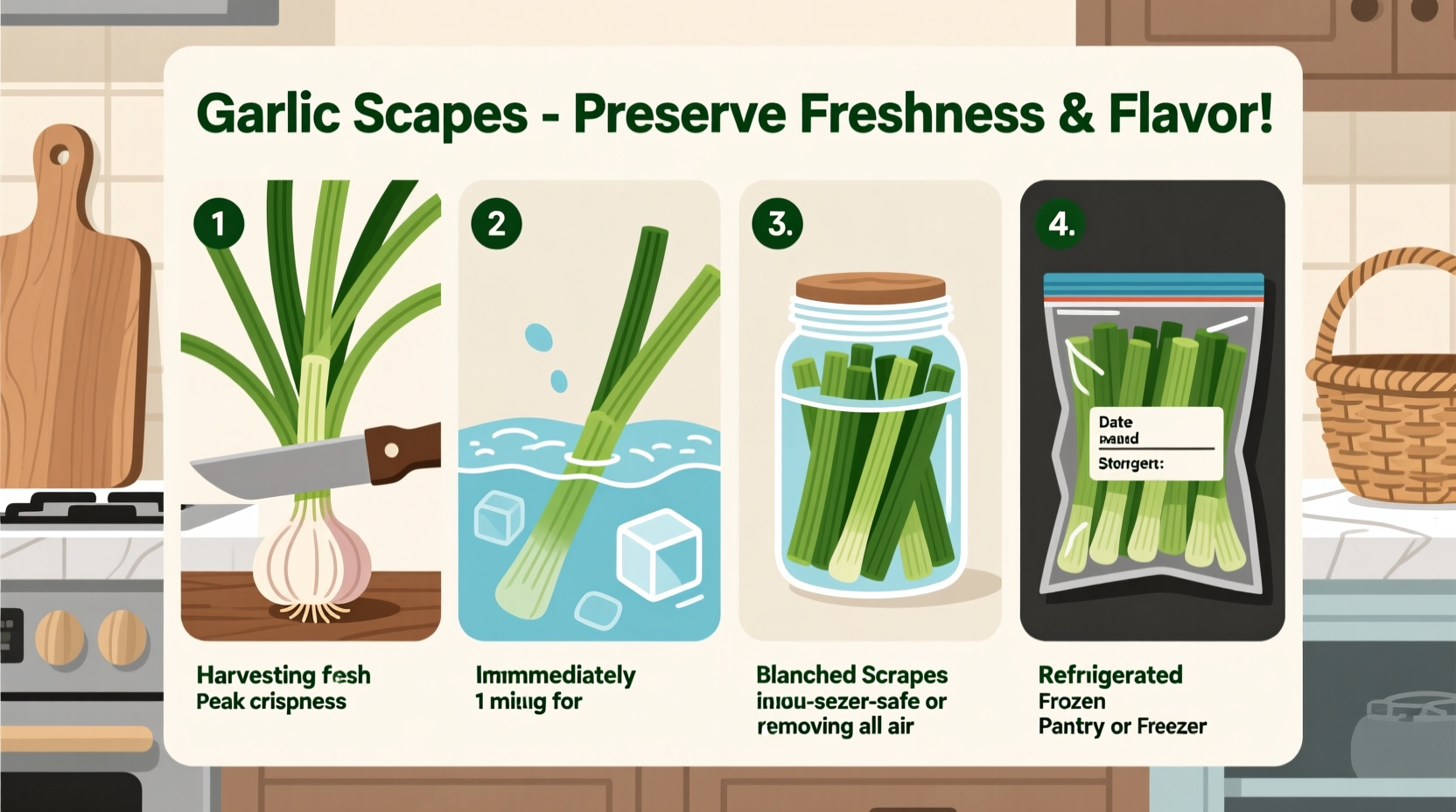Garlic scapes, the curly flowering stalks of hardneck garlic plants, offer a brief seasonal window but don't have to be a fleeting culinary delight. When harvested at their peak in late spring to early summer, these tender shoots provide a milder garlic flavor perfect for preservation. Understanding how to preserve garlic scapes properly transforms your seasonal bounty into year-round flavor without sacrificing quality.
Why Preserve Garlic Scapes?
Garlic scapes typically appear for just 2-3 weeks during the growing season, making preservation essential for enjoying their unique flavor beyond summer. Unlike mature garlic cloves, scapes have a delicate texture and milder taste that disappears quickly if not stored correctly. The University of Minnesota Extension confirms proper preservation maintains both nutritional value and culinary versatility of seasonal produce.
Best Methods for Preserving Garlic Scapes
Freezing Garlic Scapes (Most Versatile Method)
Freezing preserves garlic scapes' fresh flavor while maintaining texture for cooked dishes. This how to preserve garlic scapes long term technique works for both whole scapes and processed forms:
- Clean scapes thoroughly and trim root ends
- Chop into 1-2 inch pieces or leave whole
- Blanch in boiling water for 60-90 seconds
- Immediately plunge into ice water bath
- Dry completely on clean towels
- Portion into freezer bags, removing excess air
- Label with date and freeze flat for easy storage
Pro tip: Freeze chopped scapes in ice cube trays with olive oil for ready-to-use cooking portions. Frozen scapes maintain quality for 10-12 months when stored at 0°F (-18°C).

Pickling Garlic Scapes (Tangy Flavor Preservation)
Pickling creates a delicious condiment that preserves garlic scapes' crisp texture while adding complexity. This method for preserving garlic scapes yields a versatile ingredient:
- Prepare scapes by washing and trimming
- Combine equal parts vinegar and water with 1 tbsp salt per cup
- Add spices like mustard seeds, peppercorns, or red pepper flakes
- Pack scapes into sterilized jars
- Pour hot brine over scapes, leaving ½ inch headspace
- Process in boiling water bath for 10 minutes
Pickled scapes develop optimal flavor after 2-3 weeks and remain shelf-stable for 12-18 months. The National Center for Home Food Preservation confirms proper canning techniques prevent spoilage while maintaining food safety.
Dehydrating Garlic Scapes (Concentrated Flavor)
Dehydrating creates intense garlic flavor in compact form. This alternative preservation technique for garlic scapes works well for seasoning:
- Slice scapes thinly (⅛ inch) for even drying
- Arrange in single layer on dehydrator trays
- Dry at 125°F (52°C) for 8-12 hours
- Test for crispness - should snap when bent
- Store in airtight containers with oxygen absorbers
Dehydrated scapes last 6-12 months when stored properly. For stronger flavor, grind into powder using a spice grinder. This method concentrates the garlic essence while removing moisture that causes spoilage.
| Preservation Method | Prep Time | Shelf Life | Best For |
|---|---|---|---|
| Freezing (blanched) | 20 minutes | 10-12 months | Cooking applications |
| Pickling | 30 minutes | 12-18 months | Salads, sandwiches |
| Dehydrating | 15 minutes + drying time | 6-12 months | Seasoning, rubs |
| Pesto (frozen) | 25 minutes | 8-10 months | Pasta, spreads |
Garlic Scape Pesto Preservation
Transforming scapes into pesto creates a versatile preserved product. This creative way to preserve garlic scapes combines preservation with immediate culinary application:
- Blend 2 cups chopped scapes with ½ cup nuts (walnuts or pine nuts)
- Add ½ cup grated Parmesan and 1 cup olive oil
- Season with salt to taste
- Portion into ice cube trays and freeze
- Transfer frozen cubes to labeled freezer bags
The Oregon State University Extension notes that freezing pesto in small portions maintains freshness while providing ready-to-use flavor boosts for soups, pasta, and roasted vegetables.
Storage Guidelines and Shelf Life
Proper storage determines how long your preserved garlic scapes maintain quality. Each method has specific requirements:
- Freezer storage: Maintain consistent 0°F temperature, use within 12 months
- Canned goods: Store in cool, dark place below 75°F, use within 18 months
- Dehydrated products: Keep in airtight containers with oxygen absorbers
- Refrigerated items: Pickled scapes last 2-3 weeks after opening
Always label preserved items with date and method. The USDA Food Safety and Inspection Service recommends checking preserved foods for signs of spoilage before use, including mold, off-odors, or bulging containers.
Using Preserved Garlic Scapes in Cooking
Each preservation method affects how you'll use garlic scapes in recipes:
- Frozen scapes work best in cooked dishes like soups, stews, and stir-fries
- Pickled scapes add brightness to salads, sandwiches, and charcuterie boards
- Dehydrated scapes function as seasoning in rubs, marinades, and compound butters
- Pesto cubes melt directly into hot pasta or soups for instant flavor
When substituting preserved scapes for fresh, remember that frozen and pickled versions have slightly milder flavor than fresh, while dehydrated scapes are more concentrated. Adjust quantities based on your preservation method and desired flavor intensity.
Troubleshooting Common Preservation Issues
Even with proper technique, preservation challenges can occur:
- Freezer burn: Caused by air exposure - ensure bags are completely sealed
- Mold in pickled goods: Indicates improper sealing or incorrect brine ratio
- Soft texture after freezing: Result of insufficient blanching time
- Loss of flavor in dehydrated scapes: Caused by exposure to light or moisture
Following tested preservation protocols from agricultural extension services significantly reduces these issues. The key is understanding that each preservation method has specific requirements for optimal results.











 浙公网安备
33010002000092号
浙公网安备
33010002000092号 浙B2-20120091-4
浙B2-20120091-4